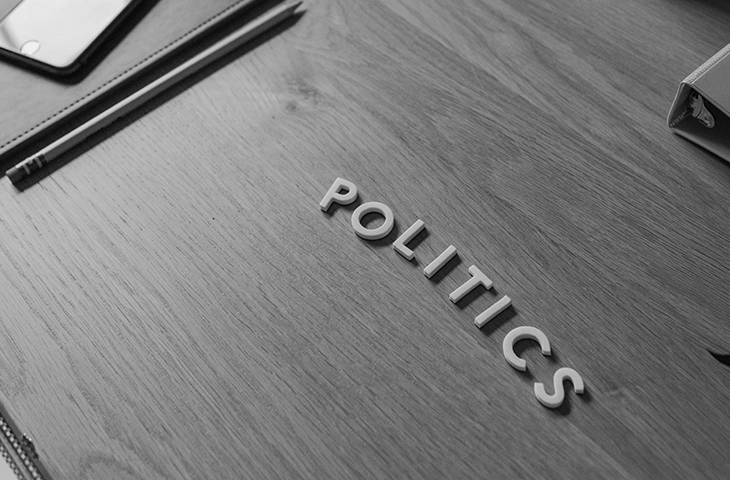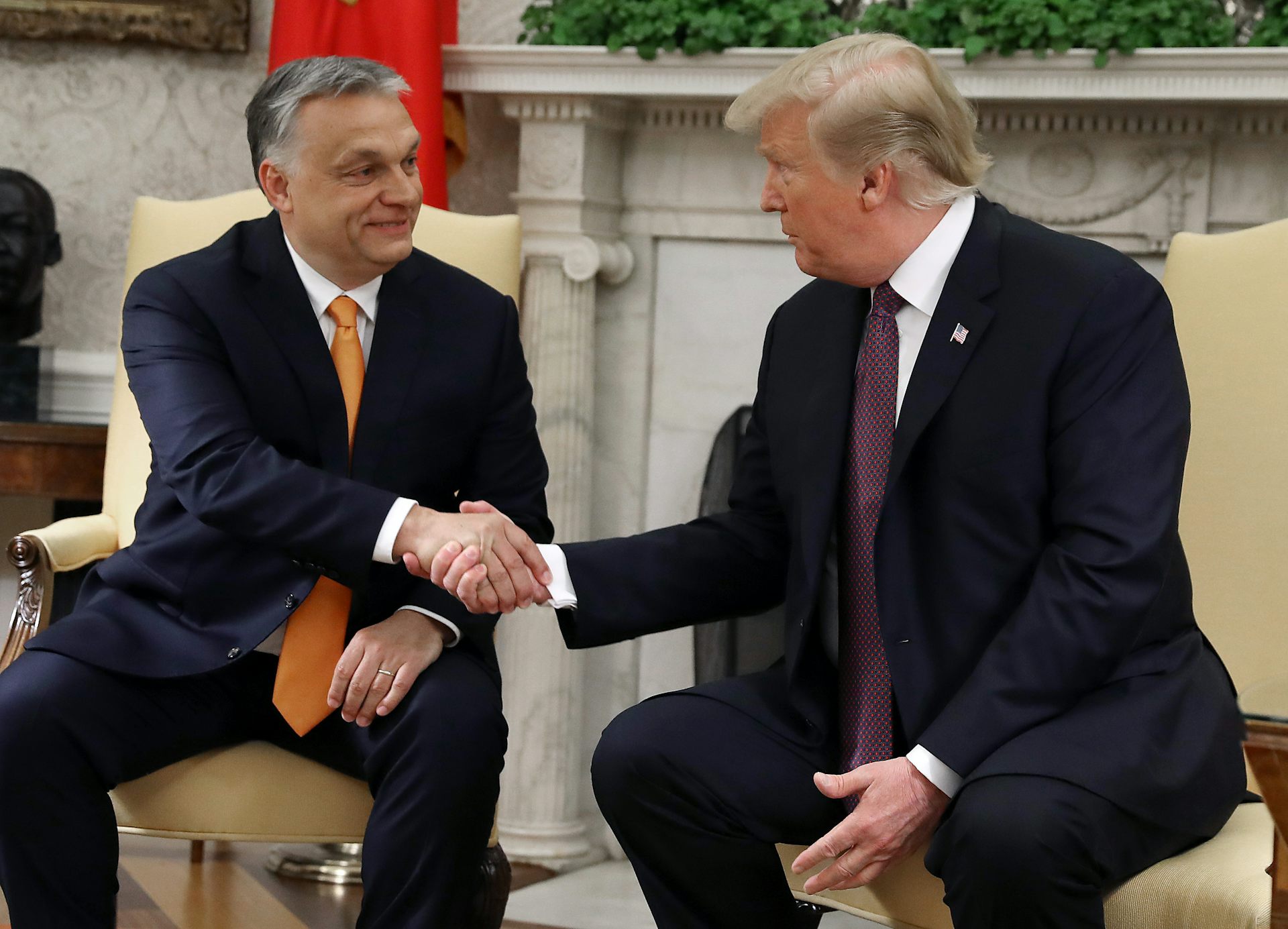We Just Saw The Cracks In Trump’s Wall Of Power

The opening months of President Donald Trump’s second term have been studded with eye-popping power plays targeting cornerstones of American institutional power: Neutering big business. Forcing white-shoe law firms and elite universities to supplicate. Strong-arming some of our oldest global allies.
But this week, for the first time since he came roaring back to power, “the great grovel” — as my boss John Harris aptly dubbed it — appears to be meeting its limits.
Just hours after urging freaked-out investors and voters to “BE COOL,” quadrupling down on his global trade war, Trump suddenly reversed course Wednesday, pausing some of his sweeping tariffs for 90 days.
A few hours later, Speaker Mike Johnson was forced to pull a critical budget vote due to a conservative mutiny — even after Trump himself leaned over and over again on key holdouts.
It was a striking one-two punch attacking the narrative that has surrounded Trump since November — that he is a political juggernaut able to run roughshod over his party and beyond to get his way on everything from economic policy to his choice for Cabinet secretaries. On Wednesday, Trump implicitly acknowledged there are, in fact, checks on his power: the markets and, if you squint, his own party.
On tariffs, the comedown was sudden but not surprising. After a week of market turmoil that spread from stocks to, crucially, government bonds, Trump finally flinched after days of insisting that there would be no delays and that the world should hunker down for a long, nasty global trade war.
"I know what the hell I'm doing,” Trump told a gathering of House Republicans Tuesday night, bragging that countries have been “kissing my ass” to try to make trade deals.
After the fact, Trump’s courtiers called it all part of a well-articulated plan. “This was his strategy all along,” as Treasury Secretary Scott Bessent put it, citing outreach from some 75 countries begging Trump to negotiate for some sort of tariff reprieve.
Yet this is a case to take Trump both seriously and literally: By Trump’s own admission, he was spooked about the sharp selloff of Treasuries — admitting, as is well known but rarely acknowledged by him personally, that he very much cares about what other people think.
“The bond market is tricky,” Trump told reporters Wednesday. “I saw last night where people were getting a little queasy … jumping a little bit.”
And, no, it wasn’t just other people who were queasy. A person I spoke to close to the White House confirmed: Internal worry about panic spreading to government bonds, usually a safe haven during economic volatility, are precisely what made Trump do a 180.
It wasn’t just Wednesday’s U-turn, though, that exposed the chinks in Trump’s political armor. It was the entire week of headlines that preceded it. The vast, impressive coalition that catapulted Trump back into the White House started to fray as the MAGA faithful took stock of the shock tariffs.
Start with the sniping on display from Trump’s allies in Silicon Valley and on Wall Street, including many who were openly balking at his full-bore embrace of protectionism. Even Elon Musk, Trump’s most prominent adviser, reportedly tried to get Trump to back off his tariff obsession, then took to openly attacking top trade adviser Peter Navarro as “dumber than a sack of bricks.”
Vocal supporter and hedge fund mogul Bill Ackman warned Trump of a “self-induced economic nuclear winter” and accused Commerce Secretary Howard Lutnick of profiting from a bad economy. And the discontent even spread to the podcasting bros who helped connect Trump with a legion of young men during the 2024 campaign, including Barstool Sports’ David Portnoy, who claimed to have lost $20 million after Trump introduced his latest tariffs, with Daily Wire’s Ben Shapiro calling it “about as bad a rollout as you can do.”
“The idea that this is inherently good and makes the American economy strong is wrongheaded,” Shapiro told his viewers. “It’s untrue. The idea that it is going to result in massive re-shoring of manufacturing is also untrue.”
The unease spread to the populist intellectual wing of the MAGA firmament. Pro-tariff economist Oren Cass — who has close ties to Vice President JD Vance — sent a warning to Trump in a New York Times op-ed Tuesday. While he endorsed the president’s 10 percent global tariff, Cass argued that the administration was moving too quickly in enacting the additional “reciprocal” levies that could create “maximal disarray” in supply chains.
The image of Trump losing control was compounded on Capitol Hill, where the president’s chokehold on his own party appears to have slackened. Enough Republicans joined Democrats to approve a Senate measure that would reverse Trump’s tariffs on Canada, then seven GOP senators — including Trump allies like Sens. Rand Paul of Kentucky and Chuck Grassley of Iowa — co-sponsored legislation to strip away Trump’s power to slap on tariffs without congressional consent.
Meanwhile, House conservatives who have fallen in line with Trump on essentially everything — from re-electing Johnson as speaker to backing stopgap spending bills they’ve railed against for years — drew a red line on a critical budget vote, furious that they weren’t getting promised spending cuts.
Several even rebuffed Trump’s personal outreach. Rep. Chip Roy of Texas told Trump he wouldn’t play ball at a Tuesday White House meeting. Rep. Andy Harris (R-Md.), the Freedom Caucus chairman, wouldn’t even take the meeting.
Trump, meanwhile, appeared to miscalculate in trying to appease the holdouts. He publicly committed to target $1 trillion worth of spending cuts over 10 years — about half of what conservatives have been gunning for. Then, at Tuesday night’s NRCC dinner, he made exactly the kind of argument guaranteed to grate on a bunch of ideologically driven conservative firebrands: Just shut up and vote.
“Close your eyes and get there,” he demanded. “It’s a phenomenal bill. Stop grandstanding.”
The results were predictable: After a day of wrangling Wednesday, including lengthy huddles with top leaders in both chambers, the upset members held their ground. Johnson was forced to delay the vote and find a Plan B.
Yes, the post-”Liberation Day” market chaos might have played a key role in spreading unease. But don’t forget about the lifeblood of any politician — public approval. A Quinnipiac University survey released Wednesday found Americans widely skeptical of Trump’s tariff campaign. And a new Economist/YouGov survey found a five-point spike in disapproval of Trump’s job performance, to 51 percent, after last week’s announcement.
Maybe Trump’s reversal on reciprocal tariffs will staunch the bleeding. Certainly many of his already reluctant critics reversed their own course after Trump did: “This was brilliantly executed,” Ackman posted. “Textbook, Art of the Deal.”
But maybe not. Trump might muse about running for a third term, but most Republicans know very well that he’s not facing voters again — and they are. So when they see signs of weakness, as they saw this past week, don’t be surprised if even MAGA faithful start to feel more inclined to freelance.


